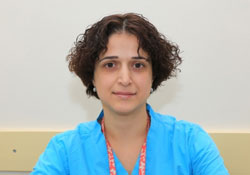A doctor works to spread awareness and stop antibiotic resistance in Armenia

WHO
Hrachuhi Ghazaryan is a medical doctor who has worked at one of the largest paediatric hospitals in Armenia since 2006, when she first joined as a medical resident. She also teaches at a medical university. Over the past decade, she says she has seen a marked increase in cases of antimicrobial resistance (AMR) among her patients, though the lack of robust data collection on AMR in Armenia makes it difficult to specify how much the problem has grown. Still, she says she sees approximately 10 severe cases each year of antibiotic resistant infections in non-immunosuppressed patients. According to Ghazaryan, most cases of antibiotic resistance appear in E. coli, methicillin-resistant staphylococcus aureus (MRSA), Shigella and Salmonella infections.
The consequences of such infections can be severe. For the patients, themselves, antibiotic resistant infections can lead to significantly longer courses of treatment and hospitalizations. Ghazaryan saw one case that required a four-week hospital stay; under normal circumstances, antibiotics would have cleared up the infection within three or four days. This kind of prolonged illness and treatment can take a heavy toll on patients’ emotional, as well as physical, well-being. Moreover, it can lead to increased costs for treatment, as doctors are often forced to use more expensive antibiotics. This is a serious problem for a country like Armenia, which has limited resources for health. “You are spending a lot of money on cases that could be prevented,” says Ghazaryan.
Prevention: implementing prescriptions, safe hygiene practices
The challenge of antibiotic resistance in Armenia stems in large part from the fact that pharmacies don’t require a prescription for antibiotics, meaning that patients often start taking them before they even see a physician. “With every infection, I say we should wait, we should see,” says Ghazaryan. “It is not easy to wait, it is easy to prescribe. But in the end, if you do that, you are not a good doctor.” It can be difficult to take a “wait and see” approach when patients are pushing for antibiotics, but Ghazaryan says this is one of the keys to stopping the spread of AMR. The Government of Armenia is currently considering a programme to implement prescriptions for antibiotics, which Ghazaryan views as an important and positive development.
Another important aspect of prevention is to implement safe hygiene practices among hospital staff. The paediatric hospital where Ghazaryan works instituted a clean hands programme five years ago, with support from WHO. Now, she says, every doctor, nurse and other health worker keeps hand sanitizer in their pocket, and it is available in all corridors. “Everyone knows they should clean their hands, everyone knows the correct way,” says Ghazaryan. “I think this is a very important step.”
Education: key to stopping antibiotic resistance
Educating health workers about how to prevent infections is vital, but it is equally important – and sometimes more challenging – to educate them about best practices in prescribing antibiotics, including the means of administering the drugs, the dosage and duration of treatment. “Unfortunately, sometimes we see misunderstanding or ignorance among health care workers,” says Ghazaryan. “But prescribing antibiotics when you don’t need to is the old way to think about treating the patient.” Ghazaryan has helped develop guidelines for her hospital on the use of antibiotics, which have been well received by her colleagues. She hopes that the Ministry of Health will soon give its approval to roll these guidelines out to other health facilities in the country. In her experience, patients tend to accept the advice of health workers when it is consistent, making it essential to have these kinds of recommendations to guide health care workers in the use of antibiotics.
“I am always telling students, residents and parents, we have real power when we have proper antibiotics,” says Ghazaryan. “But if we overuse them, we will have a situation where we have nothing. Then these bacteria will kill us. So we should be very careful and do everything to protect our resources. This is power, and it is our responsibility to protect it.”



